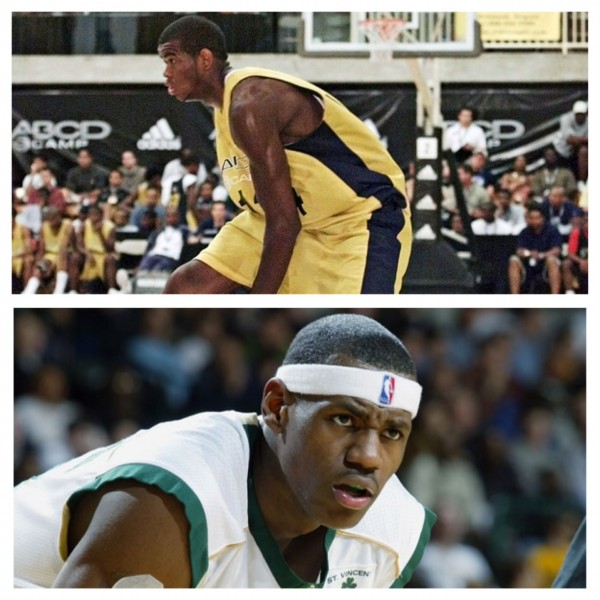My father used to tell me that history was as important as any subject you could study in school. He argued that the failure to learn from prior mistakes was detrimental enough to cause failure no matter how many additionally strengths you portrayed.
As the college hoops season heats up and the NBA closes in on its midway point, there is a lot to enjoy within the basketball world. This collegiate crop is fortunate to have a wealth of talented freshman. Many of those freshman might well have jumped into the big leagues had former NBA commissioner David Stern not pushed for rule changes that forced youngsters to spend at least one year beyond high school doing something other than playing pro ball in the U.S.
Stern, despite all his question marks, clearly studied history. And one of the stories he likely encountered during the course of his education was that of Lenny Cooke. Before LeBron James, Lenny Cooke was the name many discussed in major amateur basketball circles. Cooke was a highly skilled, 6’6 swingman from Brooklyn who completely dominated the high school level in the New York/New Jersey area some 15 years ago.
Cooke’s high school eligibility ran out as a result of him turning 19 during his senior year. He eventually put his name into the 2002 NBA Draft but went unselected. He bounced around a variety of summer pro-am leagues and the NBDL, but never fully realized the career he seemingly felt was such a certainty early on in his life.
Showtime has put forth a handful of semi-documentaries on him based on a tremendous amount of tape concerning his early career. Cooke appeared at the famed ABCD prep basketball camp in New Jersey on two different occasions, drawing massive attention by the time his second go around began.
Cameras were rolling for much of these excursions and, unlike LeBron and Kobe, Cooke let just about anyone into his life. He was willing to listen to those around him and, needless to say, their advise wasn’t always best.
While Cooke is a great story about what can happen when talent listens to the wrong people, his story also personifies a lot more in regard to human nature and how it plays into the sports world.
There is footage of Cooke rolling around Las Vegas as an 18 year old wearing baggy clothing and large chains. He is rumored to have been flown out on a chartered jet by a “guardian” who obviously helped him in ways that don’t matter now. He also is seen in clubs with Foxy Brown’s younger brother, living the celebrity lifestyle prior to even beginning his senior year in high school.
Needless to say, the documentaries and articles created in lieu of Cooke’s downfall illustrate his cautionary tale. Hindsight is always 20/20 and people can now say, with ease, that Cooke was surrounded by the wrong leadership.
But the game footage of Cooke way back when is even more revealing in that it serves as a prime example of psychological misevaluation in lieu of evaluators paying attention to all the wrong things.
While Cooke clearly had major potential, he also had fundamental issues within his game that he obviously never bothered fixing. He had a propensity to dribble with his head down. He did not move well without the ball whatsoever. While a crafty and successful passer, he also often forced the ball to teammates when things were not there.
Cooke spent a large chunk of his downtime at the camps talking to others. He had many a conversation with campers Carmelo Anthony and LeBron James. Those three names formed the “Holy Trinity,” of high school basketball talent at the turn of the millennium, yet only two of their names are broadcast in the bright lights nowadays.
The conversations which ensued were typically based on Cooke’s discussion of how many points per game he was averaging. Cooke never seemed overly concerned with wins and losses. While James and Anthony had a calmness that was forthcoming in them allowing the game to come to them, Cooke lacked that mature sort of floor vision and demeanor.
We as sports fans, analysts, gamblers, etc. depend on the media and overall flow of information to guide us in our intake of sports in general. We want injury news, updates on how athletes and teams perform on certain surfaces and given weather conditions and we want these and other updates ASAP.
People often bank their opinions on younger athletes based on the evaluations and beliefs of media analysts and broadcasters alike without legitimate motivation. What the Lenny Cooke story signifies for me, more so than anything else, was that is overall evaluation as a basketball player was extremely incomplete and misassesed.
Let me continue this discussion by saying that talent evaluation in general is a very difficult process. Ask any NFL or pro sports team about how difficult it can be to truly gain and understanding on a player/person and how that individual will respond to bright lights and money and you will have a lot of thoughts and opinions with no set alternative standing out as being anywhere near bulletproof.
In a few months its likely that Aaron Hernandez will go to trial for allegedly murdering a “friend.” Since Hernandez’ downfall first began, stories have developed in which many people expressed that they knew all along that he had concerning issues within his personal life. Scouting companies have also stated that they reported, directly to certain pro teams, of psychological issues identified within Hernandez’ makeup as he let the University of Florida.
In no way do I mean to chastise Lenny Cooke and compare him to a man who supposedly could have murdered and/or attempted to murder up to five different people. But, it’s interesting that Hernandez’ issues were overlooked based on the fact that he was an excellent football player who, if you watched any tape of him in college whatsoever, was destined to be, at worst, a solid pro tight end.
Cooke’s shortcomings could be tied to a lack of development that would have likely taken place within a college program. Watching guys like Coach K, Sean Miller, Mike Brey and Roy Williams and the work they have proven capable of with young men whose actual skills do not match their perceived talent when they step foot on campus is tremendous. Had Cooke gone to St. John’s and played under Mike Jarvis for one or two seasons, he might be an eighth year pro with an expanded bank account right now.
But, as stated earlier, if you watch tape on Cooke, there were a lot of concerns about his “playground” mentality from an early point in time. He never displayed a true understanding of how to play in a controlled environment and it showed at every level. His days in the NBDL were filled with struggles and shortcomings dictated by his overall lack of understanding in terms of what it meant to play at the pro level.
What does Cooke’s story tell us as basketball observers? Well, any story always has a few different meanings, but my primary opinion is that you have to make your own personal assessment of a player or team no matter what anyone else says.
Sports are filled with coaches who have differing styles and approaches. As a fan or handicapper of any sport, differing issues and statistical evaluations might be weighted more heavily than others for different people.
Transferring these opinions to the collegiate game as it currently exists (and keeping the discussion relevant to hoops in general), a lot can be taken away from how the media is presently scoping the current stable of potential pros.
Take the current Kansas team in place down in Lawrence. Despite their five losses, they are widely believed to be a legitimate national title contender. A large reason for that is the newfound and sudden hype surrounding freshman Joel Embiid.
There is a lot to love about Embiid and where he comes from. By all accounts, he could well become a dominant NBA center for years to come. But, for now, he has publicly stated that he feels as if another year under coach Bill Self would do him a ton of good.
Watch the tape of Embiid and his statements are confirmed. He still gets pushed around in the low block at times and he is a bit slow in reacting to developments on the offensive end. His overall athleticism negates that, but it won’t happen so easily for him at the next level.
On the flip side, many have discussed fellow Jayhawk freshman Andrew Wiggins as being a borderline “bust.” They feel as if Wiggins hasn’t lived up to the hype and lacks the offensive firepower right now to be the player many assumed he would be in his first year on national television.
Wiggins is a kid who still needs to grow into his body. He also needs to cut down on the perimeter shots he takes even though he connects at a decent percentage. That being said, Wiggins is a motivated defender and serious competitor. He attacks the basket relentlessly with a great first step, yet he doesn’t force plays. How he plays in March will tell us a lot about where his mentality is as far as being an end of game performer and “alpha dog” worthy of a top selection in the draft.
Other freshman have also been evaluated in a variety of ways. Aaron Gordon of Arizona has been lauded as a big time talent despite the fact he has no jump shot and is an awful free throw shooter. He needs, at minimum, another year in Tucson under Sean Miller if he wants any prayer of being an effective NBA player.
It will also be interesting to see how he performs now that he will be asked to do more with the injury to Wildcat forward Brandon Ashley altering this rotation. Ashley’s being out could enable the ‘Cats to go with Gordon a the power forward position a lot more.
But, tune into ESPN and they’ll tell you that Gordon is the best thing since sliced bread. Gordon is a guy who has the freakish skills to be on SportsCenter three times a week. But, his highlight reel dunks and blocked shots aside, he’s a player who needs a ton of work and that will manifest itself in his upcoming performances heading into and including March.
Kentucky has a roster chalk full of freshman. They are a bit difficult to evaluate at the moment because they are still coming together and their guard play has not proved as effective as John Calipari would have hoped. Calipari lashed out at the local media based on what he felt was undue criticism of his players.
Regardless of how you view the absurdity that is the media attention provided to college athletics, you have to understand what Calipari was doing. He wanted to establish the “us against the world” mentality that is needed in any champion. The fact that he took to the media to do it rather than go about it in a more private manner hints at a potential lack of confidence in this bunch. At the end of the day, however, the message he is sending will amount to whatever the media wants you to believe it is, assuming you are willing to believe it.
Do we know how good Julius Randle and the Harrison twins are right now? I’m not too sure, but I’m guessing Calipari has a decent idea. Take his comments for whatever you want to, but I tend to think the boys from Lexington are more deserving to be perhaps 10-1 or 12-1 to win it all as opposed to their current figure of 5/6-1.
In a financial market, it’s difficult to hide from the truth you can use shady accounting practices to manipulate reportings, but it will likely catch up to you at some point. The same can be said for life and sports. Your issues and weaknesses may go undetected for a long time. But, if you have a real problem, it will manifest itself in reality sooner rather than later.
Sport is a great outlet for such evaluation because a new game means a new contest and opportunity to prove yourself and your team’s worth against a completely different form of competition.
I expect the coming months to tell us a lot about the landscape for collegiate basketball. Evaluators have their opinions and those could well change as time goes on. What some of these players do now may or may not indicate a precedent for what they can or cannot do at the next level or stage of their career.
But just remember that, even if you think you have a guy figured out, you might not have even the slightest clue. Lenny Cooke was supposed to be the real deal. People will now look at his story and point to a lack of leadership and maturity as the root cause of his demise.
Maybe those issues were, but if Cooke had worked on his actual game and developed a floor understanding in line with what was needed of him at the next level, he would have at least been drafted by someone.
Cooke’s lack of true basketball understanding was obvious when watching tape of him playing against other perceived “elite” prep talent. It caught up to him in the end, and the truth came out.
I don’t know what the fortunes of guys like Embiid, Wiggins, Jabari Parker and the Kentucky freshmen hold. Sports prognostication is not fortune telling and there is no exact science with which to approach it.
But, if you know a game or sport and continue to develop your awareness about how it is evolving and changing, the answers are there for the taking. Specifically within the college game, there is enough of a sample size within the given seasonal structure to allow one to accumulate knowledge of a team or player’s tendencies.
Use what you have and remember to always question the perceptions and assumptions others around you make. Life is full of lessons, and the sports world is no different.







